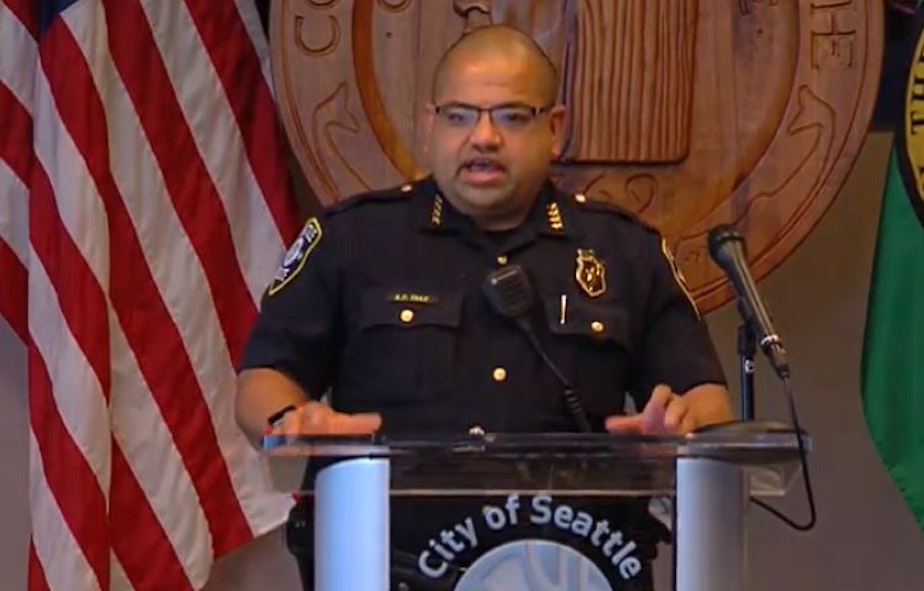Seattle announces changes to police patrols: More patrols, shorter shifts, and less overtime pay

Taking his first step into the role of interim police chief, Adrian Diaz announced a shift in Seattle policing that will move 100 officers to patrol duties, while also increasing patrol shifts, and decreasing overtime pay.
Chief Diaz made the announcement Wednesday morning, along with Mayor Jenny Durkan.
The Seattle Police Department will move 100 police officers from specialty units to patrols that respond to 911 calls. Chief Diaz said that patrol officers are currently spread thin and unable to respond to these calls adequately.
“There is more to this than having more cars on the street or getting to emergency calls faster," Diaz said. "One of my primary goals as chief is to reinvent what community engagement looks like for this police department. It is tough to engage community from inside a car, but when you are going from call-to-call, that is really the only option we have."
The conversion of 100 officers to patrol duties is part of a series of related changes coming to the department, which include:
- An increase of patrol shifts (more officers will work shorter shifts)
- A new patrol shift from 3 p.m. to 1 a.m.; four days on, three days off (Diaz said this shift will have the highest levels of calls)
- A decrease to the overtime budget
- An increase in supervisory accountability
The police department aims to make these changes within about two weeks, and has set a tentative deadline by September 16 to start the move, Diaz said. Officers with traffic enforcement, the anti-crime team, and community policing team will be among those converted over to patrol.
Arguing for more patrol officers
Diaz further commented that Seattle has fewer patrol officers than "in recent memory." This is because, over time, SPD has developed specialty units to respond to specific concerns. This has drawn down on the number of patrol officers available to handle 911 calls.
“Considering current personnel, budget, and other realities, these specialty units are a model we can no longer afford," Diaz said. "So today, I am announcing an initial step to enhance our 911 response capacity. Working with our command team, and unions, we are redeploying 100 personnel into 911 response."
Sponsored
“In almost every neighborhood in the city, over each of the past five years, one of the top concerns, if not the top concern, expressed by thousands of community members in our public safety survey has been a lack of police presence and capacity," he said.
"These moves will begin to address this concern, and they will bring vital back up to patrol officers who have been racing from call-to-call too often."
In theory, Diaz said, adding more patrol officers will allow them to be more involved with community members, and less detached from the neighborhoods they serve.
Shift in Seattle policing?
Protesters and community activists have also been calling for changes to the Seattle Police Department -- primarily a 50% cut to the department's budget. They want funds diverted to programs that invest in marginalized communities' health and economic well-being, rather than policing.
Many have argued that police should not be responding to mental health crises or other community problems. Rather, people trained in these areas should handle these cases, which would hopefully lead to less violent responses.
Sponsored
Durkan appeared to address this sentiment Wednesday, saying the shift to patrol officers will start a process to better determine which 911 calls -- out of the more than 800,000 Seattle receives each year -- require an armed police response, and which could get a different response.
“Every call for help doesn’t necessarily need an armed police officer, but every call for help has to be answered by someone who is trained, and who is available 24/7 to give that assistance," she said.
"Scaling up those resources will be the challenge we have to face as a city. So today’s announcement is just part of our ongoing work to redirect police to where they are needed the most, and that is toward scenes of violence and high priority calls.”
Mayor Durkan said that changes to come to the department "will be guided by an inclusive community input," and added that "we need to listen to communities throughout Seattle to make sure that the next generation of Seattle policing really serves this city in the ways they need to be served.”
Sponsored
Durkan added that she believes the City Council will respond positively to the changes. There has been a rift between the mayor's office and the City Council on the issue of policing in recent months.
The Council voted on a series of budget changes that included cutting the pay of former Police Chief Carmen Best and her command staff. Durkan vetoed that legislation.

